#cleromizer
Text

devil take the hindmost…
aka my unexpected foray into love never dies art…closeups in the read more :-)


#i hate love never dies in the most loving and affectionate way possible but i never expected to be doing art about it for realsies#however. devil take the hindmost does something to a guy and i’ve had it on loop for 3 days now#i just love the idea of a gambling addict raoul being unable to resist one last bet and it costing him Everything#i love raoul i swear guys. but this song is SOOO. battle of the egos#anyways this one is for the no nose skeleton man erik fans. tried to give him more of a leroux erik vibe here#also if yall look at raoul’s cards i tried to dip my toes into cleromancy… tee hee#phantom of the opera#love never dies#phantom of the opera art#raoul de chagny#erik phantom of the opera#erik poto#poto#lnd#devil take the hindmost#my art tag
305 notes
·
View notes
Text
BD-1: *touches Cal’s hand with his tiny foot*
Cal: *tearing up* thank you
#me too cal#source: cleromancy#cal kestis#bd 1#jedi survivor#jedi fallen order#jedi survivor incorrect quotes#jedi fallen order incorrect quotes#star wars incorrect quotes#cere junda#greez dritus#merrin
356 notes
·
View notes
Text
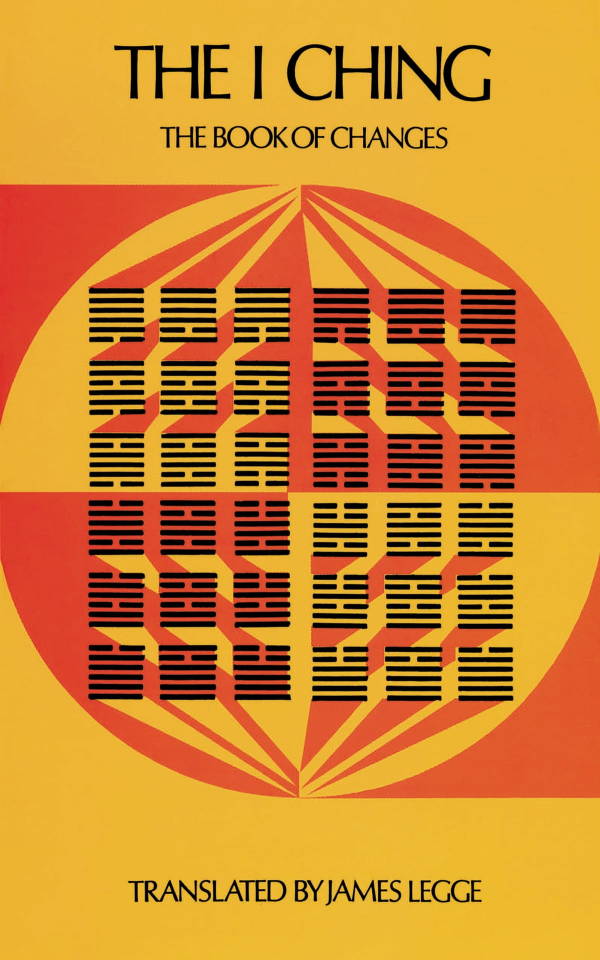
#book cover#cover design#I Ching#cleromancy#James Legge#Confucianism#China#Chinese#Taoism#change#The Book of Changes
110 notes
·
View notes
Link
Chapters: 1/1
Fandom: DCU (Comics), Batman (Comics)
Rating: Teen And Up Audiences
Warnings: No Archive Warnings Apply
Relationships: Tim Drake/Jason Todd
Characters: Tim Drake, Jason Todd
Additional Tags: First Kiss, Hurt/Comfort, New Earth
Summary:
The real reason Bats avoid using front doors, Tim thinks, is because crawling through someone’s window gives you a lot less time to reflect upon your life choices.
19 notes
·
View notes
Text
Divination
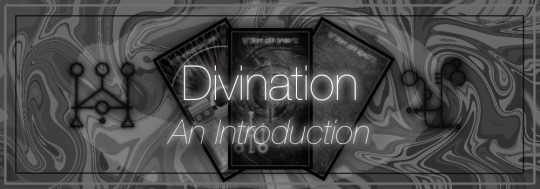

Suggested Reading
Introduction to Gnosis
Energetic Senses
Conceptualization Vs. Visualization
Basics of Warding
Spiritwork: First Steps
What is Divination?
As defined by the Oxford Dictionary:
“Div·i·na·tion /ˌdivəˈnāSH(ə)n/
Noun
noun: divination; plural noun: divinations
The practice of seeking knowledge of the future or the unknown by supernatural means.”
This can be done through a vast variety of means.
Beginner Tips
Hold off on devoting your time on studying divination unless you want to focus primarily on it. Divination practices are a rabbit hole of research, consumerism, artist support, and practice. Without mindfulness, it is very easy to lose sight of your other studies and/or practices.
Experiment with divination tools and methodologies. Everyone divines differently. Spend time finding what works best for you. What catches your eye at first may not work for you as well as another tool or method.
Interpretation is in the eye of the beholder. Hold off on doing public readings or reading services until you’ve found your eye and your voice.
Correspondences can play a huge part in divination, not so much as building a network of connected concepts like in spellwork, but for conceptual representation. Figure out what your correspondences are.
Some divination practices are aspects of closed cultures. Be sure to research and discuss divinatory practices before trying them. Through communication, you can definitely be inspired by closed practices in your own practice, while respecting the traditions they come from.
Divination is much safer than a lot of other practices, but it is a good idea to be aware of responsible precautions.
Remain aware of diviners that use divination to proselytize or pull clients into their own personal narratives. It isn’t super common, but occurs often enough to be in the back of your mind.
Understand that divinatory practices aren’t absolute. Since it is a practice that relies on interpretation and has differing methods of use, results can vary wildly. Take readings with a grain of salt.
If you receive a suspicious or ridiculous reading, especially if it involves a deity, be sure to get a second opinion.
Sometimes, you can be too close to a situation to do readings for yourself without biased interpretations. Knowing when it is responsible to get a reading from another practitioner is important.
Don’t just read about divination, talk to practitioners. See how other people interpret their tools and what methods they use.
There are hundreds of types of divination, a lot of them are a bit ambiguous. Try to start simple and work up to the more vague practices after you have some experience under your belt.
Superstitions and omens vary wildly based on cultural context and regionality. It is best to stay away from these methods until you have more experience.
Many divination tools can have similar methods of interpretations, for a lot of them numerology can be very beneficial to understand. Especially in cartomancy.
Inventing your own tool and/or divination system can be extremely beneficial. Doing so can aid in feeling more connected to your tool. On top of that you decide how readings are meant to be interpreted.
Beginner Friendly Types of Divination
Cartomancy: Tarot, Oracle, & Lenormand
Readings done with cards.
Often involves numerology
Is read in spreads, of which there are countless variations. You can even come up with your own.
Symbology, color, composition, contrast, and context can be super helpful or even necessary for interpretations.
Often somewhat rigid in structure. Oracle decks tend to be less structured.
How you pull from your deck can have a huge effect on how well you can connect with your deck. Play around with drawing methods.
A lot of contemporary decks have booklets with meanings, but these interpretations tend to be very fluffy. Divination can and should be capable of being harsh. Many websites, such as Biddytarot are also guilty of this. Many cards can be very double edged. It’s okay to use these as references at first, but I recommend pulling away from them when you feel comfortable.
Stay away from rip-off products. Try to buy directly from the artist.
Cleromancy: Bones, Dice, & Geomancy
Tossing or dropping objects and interpreting how they land.
For many tools, there are boards or mats that are also used for interpretation.
Certain methods of bone tossing are aspects of closed cultures. Be sure to do thorough research and discuss methods with practitioners of closed cultures.
Cleromancy systems are the easiest to come up with your own.
Play around with creating your own reading mats/boards. You’d be surprised at how much it can alter interpretations.
Can be the harshest of all types of divination.
Often takes the longest to interpret as there are a lot of variables to account for.
Dowsing: Rods & Pendulums
Swinging or swaying a tool and interpreting its movements.
The easiest to learn.
The type of divination that is most likely to be biased, as it can pick up on very subtle subconscious movements of the hands and arms.
Best for yes/no questions and location divination.
Pendulums are often used with a mat/board, but they are not necessary.
Tools are “programmed” before use. Meaning that the possible answers are all stated and decided on before a reading begins. Can be more important in spiritual methods of reading, but is a responsible practice regardless.
Can easily depend on headspace and focus.
Pendulums are often cheaply produced by corporations. Try to buy directly from artists, rather than from sites like Amazon.
Numerology:
The interpretations and correspondences of numbers.
Is often used in practices like “angel numbers”, which is a whole thing. I recommend reading this article by Coin And Candle about it.
Often plays a huge role in how many divination systems are interpreted.
Is the easiest type of divination and correspondence to lead into appropriative and crystal-fascist new age practices and philosophies.
Spiritual, Energetic, Chaotic, & Symbolic Divination Methods
Despite not being discussed very often, there are a few different ways to practice divination. What method is used can have a huge impact on how you connect with each reading and each tool. I recommend having a tool devoted to each method, but work with one until you’re comfortable with it before moving on to the next. There are numerous combinations of tools and methods, so it can end up taking a very long time before something clicks.
Spiritual Method: Using your intuition to feel for which cards, bones, dice, directions, etc to use, pull, and/or how to interpret them. Often requires a state of gnosis.
Energetic Method: Employing energy work to connect to a client and then using energetic senses to feel for which cards, bones, dice, directions, etc to use, pull, and/or how to interpret them. Often requires a state of gnosis.
Chaotic Method: The idea that the universe’s absurdity and serendipity will cause parts of tools and interpretations that are based off of each situation at hand. In this method, bias can be a good thing while remaining self-aware.
Symbolic: Solely using images, correspondences, and context to interpret cards. Similar to the chaotic method, but without the bias.
Self-Awareness During a Reading
As stated above, it is very easy to be biased in your interpretations. For this reason, it is important to remain self-aware. There are several ways to achieve this:
Do multiple readings with the same question.
Have your reading verified by another diviner, without giving them the entire context.
Take some time to reflect on the reading to see how your current context of the situation could have influenced your interpretations.
Take your interpretations directly from the guide books.
Take some time before a reading to try and step away from the situation.
Send a picture of the reading and the question to another diviner to see how they would interpret it.
Safety Practices
There is a lot of hype and fear mongering around divination, especially with tools like ouija boards. Things like “Evil spirits can come through and attack you”, and “You can never know what you’re connecting to” are very common. While these narratives have some truth to them, they are very much hyperbole and really only apply to the spiritual method. The largest danger when it comes to divination are people who use divination to manipulate others. This is typically done by pulling people into their personal narratives; like past lives, deity communication/godphoning, and things like “magic/astrral wars/battles”.
If you’re practicing the spiritual method I recommend cleansing the space, having wards in place, and remaining self-aware the entire time. While this gradually becomes less necessary with experience in spirit work, it is still a good idea.
Be weary of anyone who implies that the reading is a set in stone reading/future/etc. Avoid diviners who do medical readings, unless you have seen a medical professional first, at the very least. However, due to the nature of divination please remain aware that the reading is in no way absolute and there is no reason to be fearful if the reading is negative.
Divination is a form of advice. It can also be used for spirit communication, however it can be easy to get carried away in interpretations until more experience is gained.
KEEP CRYSTAL BALLS COVERED. They can bend light like a magnifying glass and can start fires!
Depending on your practice, and what you’re communicating with, it can also be wise to keep mirrors covered. The idea behind this is that it prevents spiritual entities from using the mirror to enter your space. I find that warding divination tools is sufficient enough most of the time.
To read more about me, see my master post of content, employ my services, or support me on Patreon click here!
#Divination guide#divination#tarot#cartomancy#cleromancy#witchcraft basics#witchcraft guide#begginer witch#witchcraft for beginners#informational post#Gdiv
211 notes
·
View notes
Text
emergency divination readings!🃏🔮☕💎🕯️
tarot, runes, tea leaves, pendulum, and crystals!
(info on my situation here)
for $5, you may choose one of the following:
single card or rune (see deck options below)
tea leaf reading
crystal chip scattering (see crystal list below)
pendulum reading (see pendulum options below)
add-ons:
additional cards/runes [$1 each]
my cat will choose your card(s)/rune(s) (see cat pic & bio below) [$2]
my dog will choose your card(s)/rune(s) (see dog pic & bio below) [$2]
I'll recommend a deity/spiritual entity to guide you based on your query and results; you may ask for an entity from a specific culture if you'd like (open practices only!) [$5]
please dm me with proof of payment, your choice of divination method, any add-ons or preferences, and a clear, single-sentence query. you may provide extra context to assist with the reading. tips and dona.tions appreciated.
🕯️ vnm 🃏 cshpp 🔮 gfndme ☕
options and photos of my equipment (& cute pets!) beneath the cut:
deck options:
standard smith-waite: tiny (smaller than a US quarter), pocket size (comparable to a business card), and standard size

nonstandard smith-waite: the somnia tarot by nicolas bruno (incredible photography project. eerie, dreamlike, liminal, yet the physical props give it a more grounded, tangible feel than your average deck.), the tattoo tarot (stunning art, if you like clean but complex designs, classic playing card artwork, or traditional western tattoo art, this deck will really resonate with you.), the literary tarot (each card depicts classic literary characters from around the world; deck sales benefited charity. my personal favorite. every detail is carefully crafted to appeal to book lovers. elaborate, shiny, magical. also they gave odysseus top surgery scars)
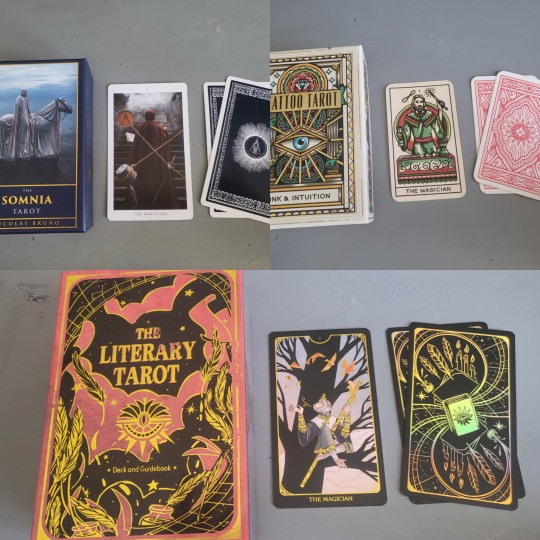
specialty decks: the caretaker (@cryptotheism, formerly @normal-horoscopes)'s normal tarot deck (completely original oracle deck, feels liminal and dark, but somehow peaceful; great for someone pondering deep mysteries or looking for advice in hard times), moreno & quijada's sonoran tarot (smith-waite's major arcana only; stunning and vibrant watercolors of sonoran desert wildlife. really showcases the power and wonder of the natural world. local purchase from indie artists who I've personally met)

if you'd like me to use a specific tarot spread template, please let me know. otherwise i will choose the best option for your query + number of cards. you can also pick a spread mat, if you like! you don't need to purchase enough cards to fill the mat; i can get creative with the placement. just let me know if you want the floral mat or the bunny mat:
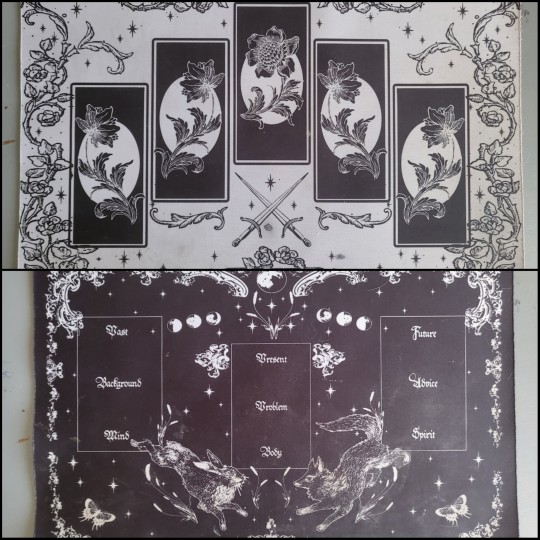
other options:
pendula: metal (this was a gift and i don't know what it's made of; brass maybe? gold in color.), howlite, glass beads with sea turtle scene
crystal chips: red jasper, various quartz, flourite, lapis lazuli, lace agate, tigers eye, sunstone, sodalite, bismuth. all stones can be thrown, or you/i can choose 5-10 specific stones that resonate with your query.
runes: elder futhark, white clay, handmade. wyrd optional.
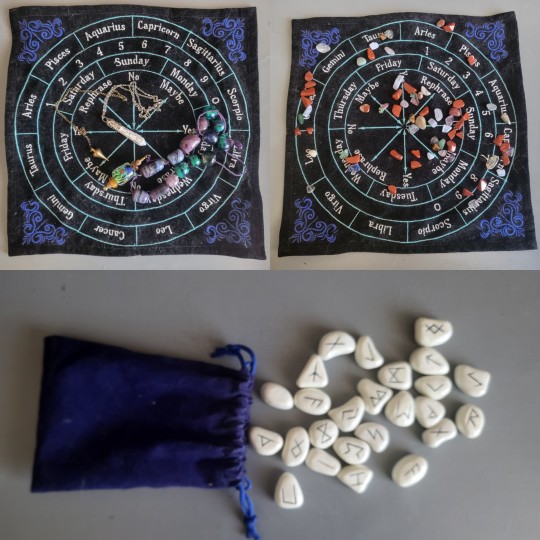
my kitty cat, nachtus:
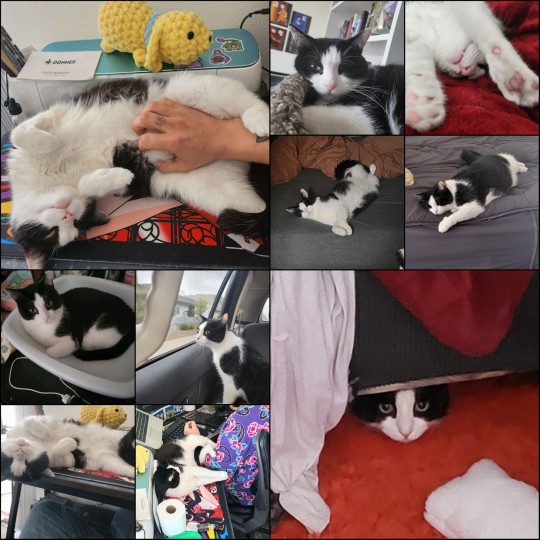
nacht came into my life through my current girlfriend, who has had him since he was born. every time she went into the room with his litter, he scrambled up her pant leg like he knew she would be his favorite person. he's about 2 years old now, and loves cuddles, belly rubs, q-tips, waking up our boyfriend in the middle of the night, bothering people while they're gaming, and sitting on my gf's shoulder like a parrot.
my puppy dog, misha:

misha came into my life through my current boyfriend, who has had him since he was a puppy. he was a rescue, along with his brother oakley, who went with my boyfriend's sister. misha is a chug (chihuahua-pug mix) and is estimated to be around 8 years old. he loves cuddles, being swaddled in blankets, barking at strangers, lying on the softest pillows he can find, and zoomies!
thanks so much for taking the time to read this. it means more than you know.
#tarot reading#rune reading#tea leaf reading#pendulum reading#crystal reading#divination#spiritual advice#deity work#deity reading#signal boost#cartomancy#cleromancy#tasseography#tasseomancy#pallomancy#radiesthesia#lithomancy#poe divination
16 notes
·
View notes
Text

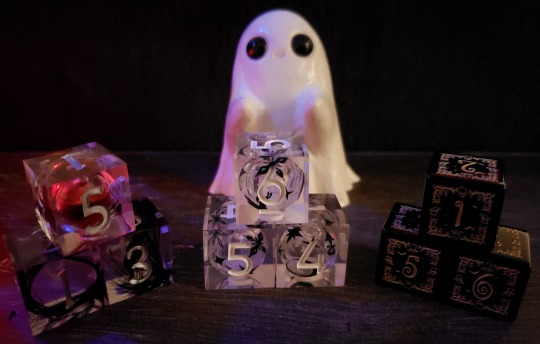


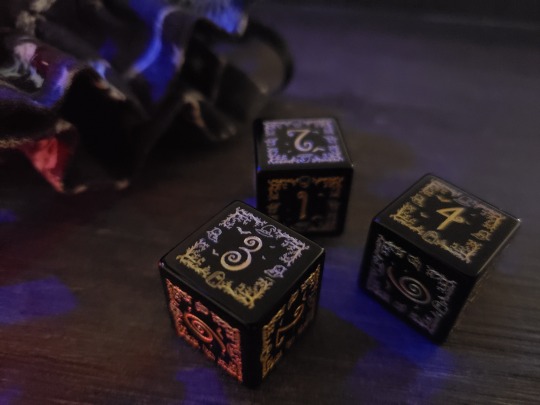
It's the time of the year to give - yes, badly wrapped up presents - But also free dice readings with pictures 🖤 🎄
Ask up to 3 questions via DM (no inbox!)
Pick a set of dice (Left | Middle | Right)
What's the funniest present you gave or received (Entertain me-)
Like, reblog and/or follow as guise of cookies
Remember that I do readings as an hobby and purely for your entertainment. So don't forget to bring your sense of humor ;)
Open until I inhale too much sugar.
EDIT: Closed for now! Getting to the readings in queue ;)
#dice reading#dice readings#free dice reading#free dice readings#dice divination#reading game#dice game#dice reading game#free reading#free readings#divination#cleromancy#astragalomancy#ask game#witchblr#readings
31 notes
·
View notes
Text
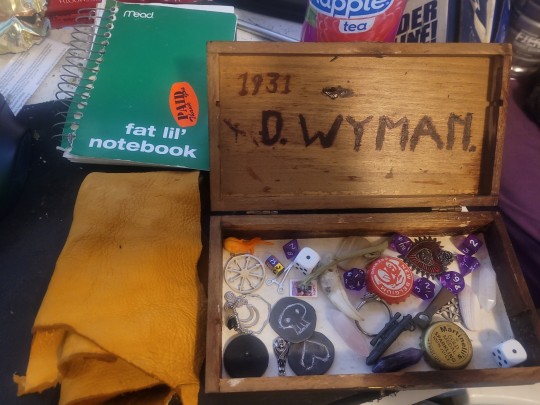
Decided to put a charm casting kit together. Am Goblin by thought and gender so collecting shinies/klikklaks/etc comes naturally. There are a few specific things I want to add, ex some specific animal bits and seeds. Not in a rush, they'll come to me.
7 notes
·
View notes
Text
looking for words like "necromancy" to describe specific specialized types of magic?
look no further
#writing#necromancer#necromancy#astrology#tarotmancy#chronomancy#cleromancy#clairvoyant#cryomany#scrying#crystal ball#dowsing#divining#floriography#horoscope#horoscopy#numerology#oculomancy#occlumency#ouija#papyromancy#pyromancy#cheiromancy#pyromancer#cryomancer#taromancy#magic#witches#writblr#wizards
10 notes
·
View notes
Text
going to create my own cleromancy kit soon :3
4 notes
·
View notes
Text
Hello! Welcome to my blog! I'm That Witch Over There~
I've found the description space to be lacking, so in case anyone is intrigued, here's a long-winded post all about the spiritual journey of my second-favorite person, me!
(My first-favorite person is my darling cat, Quinn. All must love him and despair.)
To start with, my name is Izzy! It's lovely to meet me, I'm sure. I live in the American Southwest, which is a terrible place for a born-and-raised bog witch to end up, but there you have it. I am, among many other things, a writer, dancer, gamer, cook, and proud cat-Papa.
I've been somewhat of a pagan for a while (23 years, give or take), but more in a "I believe all gods are real but I don't worship any in particular" kind of way. Do they call that a spiritualist? I don't know. It's the religious equivalent of believing your neighbors exist but never going to any of the neighborhood barbequeues or junk sales.
I observed a few pagan traditions particular to my Irish and Polish ancestors out of a feeling of deep attachment to and respect for them, but that was about it. No gods had anything to do with my practice of magic, either, or if they did, it wasn't by request and, so far as I can tell, they never made it known to me.
The 2020 election and, earlier this year, my visit to Greece changed that. I had two separate, dissimilar, and personal experiences during these times that compelled me to dedicate myself to the worship of the gods of the ancient Greeks.
While I was most strongly called to Apollon, and later Hermes as well, I do my best to make room in my worship for all of the gods, nymphs, and other beings as they become or make themselves known to me.
UPDATE: Most recently I have been delving into the philosophies underpinning Satanism and Luciferianism - not so much theistic Satanism or Luciferianism, but trying to incorporate those ideals and ethics into my life and my faith - and I'd love to find people who would like to discuss it! It doesn't escape me that Satanism does trend more strongly towards an atheistic approach, nor that regarding oneself as godly in one's own right falls under hybris and is generally at odds with Hellenic paganism, but that certainly would be an interesting discussion to have if you like! Please note that I am not particularly affiliated with any official Satanist or Luciferian organizations.
My practice of magic does trend towards Irish and Polish tradition, and I still don't tend to involve the gods in it, but if anyone wants to talk about the frequent intersection between paganism and the practice of magic today, I'd be interested to hear your perspectives. I don't especially have one tbh.
I'm also available to discuss:
- methods of divination
- the ethics of using curses in one's magical practice
- personal methods of worship
- environmentally-conscious magic
- interpretation of myths
- book recommendations
- reconstructionism vs. eclecticism
- building local community in a minority religion
- anything related to paganism (particularly hellenic but not required), magical practice, theology in general, religious history in general, or cats
I practice various forms of cleromancy and my readings are free, but I haven't worked out a good system for me for doing so long distance - if that changes, I'll update this post!
You can find me on Twitter @pagantwot, and I've just made an Insta as well with the same username.
1 note
·
View note
Link
Chapters: 1/1
Fandom: DCU (Comics), Batman (Comics)
Rating: Explicit
Warnings: No Archive Warnings Apply
Relationships: Tim Drake/Jason Todd
Characters: Tim Drake, Jason Todd
Additional Tags: Bondage, robincest meme, New Earth
Summary:
For the prompt on the robincest meme over at dcu-memes, "Tim riding Jason. Hard."
16 notes
·
View notes
Text
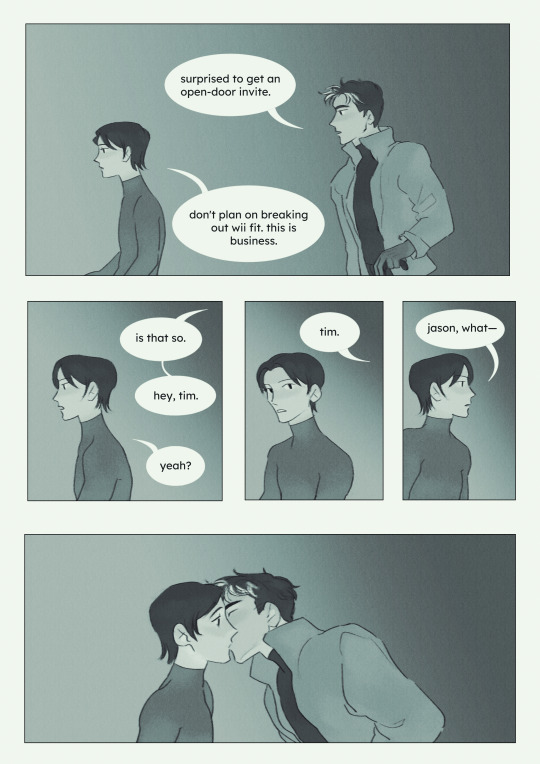

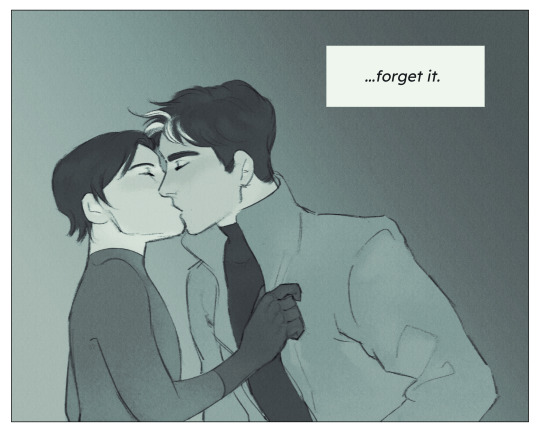
based on @cleromancy's brilliant post found here / what if after tim broke jason out of prison in robin #183 they decided to kiss about it
3K notes
·
View notes
Text
jason todd meta list
Jason Todd's canon ages, with sources
by InDarknessOftFindI
Jason Todd and Comic Book Morality
by clinicalmiddlechildsyndrome
Jason Todd, The Hysteric & Bruce Wayne, The Batman
by aresianrepose
Jason's point isn't about whether or not villains can be redeemed, it's about the people they continue to kill
by its-not-lookin-good, de-vespertiliones
Who's to blame? How Jason Todd is blamed for his own demise (Part II)
by fuckyeahjasontodd
unjust world
by lemontongues
a son asking his dad to prove that he loves him by avenging him
by blueteehood
jason todd as a meta character
by brionysea
jason values “the good guys”
by cleromancy
Why Jason and Cass wouldn’t get along
by aingeal98, tumblingxelian
Jason and Cass: Murder Victim and Murderer
by casscainmainly
Cassandra Cain and Jason Todd Are Foils to One Another.
by celestialdevils
The Pit’s influence on Jason has nothing to do with anger and is more about blunting his compassion
by bitimdrake
the debate between Jason and Bruce’s killing/no-killing rule is so fucking exhausting because they’re both right and that’s the damn point
by wanderintofics
Willis and Catherine
by firefrightfic
The Jason Todd Book Club
by pluckyredhead
Jason and his reaction to sexual assault
by pluckyredhead
the issue posed in “The Diplomat’s Son” is that Bruce questioned whether Garzonas fell or was pushed and doubted Jason’s word when Jason said he fell
by fantastic-nonsense
Post-Crisis!Jason had exactly two life goals as Red Hood: make Batman’s life a living hell by creating chaos and prove he’s “better” at crimefighting than Bruce
by fantastic-nonsense
how long was jason dead for / how long before came back to gotham
by sohotthateveryonedied
timeline of Jason coming back to Gotham
by sohotthateveryonedied
Jason being good with kids
by sohotthateveryonedied
Too Dangerous for Kids
by redhoodinternaldialectical
Jason and Bruce’s conflict is not a misunderstanding
by redhoodinternaldialectical
outward expressions of emotions
by aalghul
Jason and guns
by aalghul
Jason Todd’s Childhood Friends
by aalghul
Jason Todd- DC's Pandora's box
by mintacle
"utilitarian killing vs. no kill rule" dilemma
by mintacle
Bruce-as-Batman Vs Bruce-as-parent, Batman is the abuser and Bruce is the enabler
by mintacle
Jason’s final monologue in Under the Red Hood is so impactful and important because he’s being honest
by littledead-ridinghood
Bruce, Jason, upbringing and ethics
by cainware, littledead-ridinghood
Bruce, Jason and Robin retcons
by littledead-ridinghood
Jason grew up alone
by littledead-ridinghood
in the New52 the reason why Bruce doesn’t take Jason down personally has either changed or expanded
by comic-commentary
do you think jason pushed felipe?
by comic-commentary
What does Jason want to do with his life?
by comic-commentary
does jason carefully select/thoroughly research the criminals he kills, or is it just on sight?
by comic-commentary
Jason Todd and the Ladies: Pre-Resurrection
by comic-commentary
Jason Todd and the Ladies: Post-Resurrection
by comic-commentary
Jason and Tim in Pre52
by comic-commentary
Dick and Jason were never close in canon
by comic-commentary
Gray Areas Exist *throws glitter*
by comic-commentary
Jason consistently positions himself with the other victims of the Joker
by arkhamnyanight
canon shows Jason being remarkably, and I would say to some degree irrationally, eager to be on good terms with Bruce again
by arkhamnyanight
Jason’s motivations and plan in UTRH
by arkhamnyanight
why Jason chooses to confront Bruce rather than directly kill the Joker
by arkhamnyanight
call Jason a murder victim you cowards
by romanticizingmurder
the sanctity of life
by romanticizingmurder
What Jason says and what Jason does aren't always the same
by romanticizingmurder
how many people will die waiting for a villain to reform?
by romanticizingmurder
Countdown and Jason’s characterization
by yvtro
the brilliance of jay's progression in countdown
by boyfridged
bruce is projecting on jason and it profoundly affected jay
by boyfridged
Jason, Willis, and retcons
by boyfridged
Jason and reaching out
by boyfridged
Jason Todd trusts Dick Grayson, and so Dick is a glowing, ticking timebomb
by thecruellestmonth
Does the mass-murdering criminal Jason "Red Hood" Todd canonically support the death penalty?
by thecruellestmonth
Jason Todd + cops
by thecruellestmonth
Jason Todd + literature
by thecruellestmonth
Jason Todd vs. security
by thecruellestmonth
quick and dirty guide to Jason Todd in the masterpiece Batman: Battle for the Cowl—canon and fanon
by thecruellestmonth
Jason Todd’s knife skills
by wonderwondered
Jason Todd’s less known skills appreciation
by wonderwondered
Jason Todd’s fighting skills
by wonderwondered
Jason is a victim, not a survivor
by greylittlebird, vintagerobin. thecruellestmoth
[I will be updating the list every time I find a new meta post.]
279 notes
·
View notes
Text
They're really pulling some niche figures for these new Personas, huh?
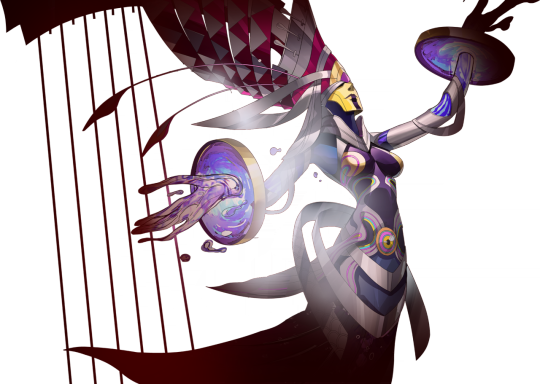
Prosymna is one of three naiad daughters of the Greek river god Asterion. Along with her sisters (Acraea and Euboea), she served as a wet-nurse for Hera. The name Prosymna means "celebrate in song," which explains her harp-like design.
(Prosymna is also a genus of snake!)

Erytheia is one of the three (or four, or seven) Hesperides, nymphs who presided over evening and sunsets. The name Erytheia means "the red one." There doesn't seem to be much mythos surrounding Erytheia specifically, but her name was assigned to a small island northwest of Gilbraltar. (Nowadays it's part of Spain! The city of Cadíz can be found there.)
Preceded by Leucothea, Erytheia is one of the two (possibly 3?) P5X Persona to be rendered as a masculine entity despite being based off a distinctly feminine mythological figure. Not sure why they're doing that, but hey, the designs are great!
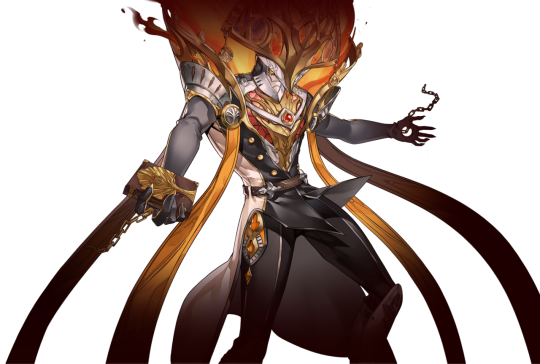
Syke is a bit of an oddball. While it would be easy to presume it's meant to represent Psyche, the Greek goddess of the soul…Psyche has already appeared as Metis' Persona back in P3 FES, so it's possible this one is a different entity. However, something worth noting: like the other Greek myth Persona in this post, Psyche came in a set of three, having been the youngest of three sisters.
Of what I've been able to dig up, Syke (or Syca) was also the name of a town in ancient Cilicia, a region in southern Anatolia. Another name for Syke was Setos, possibly based off the primordial sea goddess Ceto. Ceto is considered one of the oldest-known deities in Greek myth, and was mother to a myriad of monsters, such as the Graiae and Gorgon sisters.

Meng Po is the Chinese goddess of forgetfulness, tasked with ensuring that souls headed for reincarnation are reborn with no memories. To accomplish this, she serves a memory-wiping soup to souls crossing the Naihe Bridge out of Diyu, a subterranean maze that serves as an equivalent to hell in Chinese mythology.
This lore explains both the bowl and lantern in this Persona's design. The bowl represents the soup, obviously enough, while the lantern can be interpreted as symbolic of "guiding the dead."
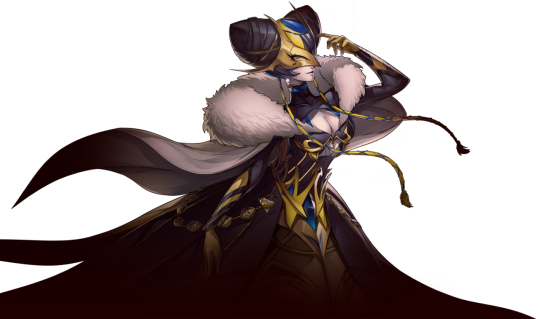
Cleodora was one of the three Thriae, prophetic nymphs who lived in the Corycian Cave of Mt. Parnassus. Though the Thriae are often considered to be the "bee-maidens" (women bearing human heads/torsos and bee wings/lower bodies) described in the Homeric Hymn to Hermes, it's possible they're different trios; the Thriae predicted the future through throwing stones (pessomancy/mantic pebbles), while the bee-maidens predicted the future through casting lots (cleromancy).
The only info I can find on Cleodora as separate from the Thriae states that she was the mother of Parnassos, who invented a way to predict the future based on birds (ornithomancy).
#persona 5 x#p5x#persona 5 the phantom x#prosymna#erytheia#syke#meng po#cleodora#Kidd speaking#not aesthetic
190 notes
·
View notes
Text
(Note: this is all totally non-rigorous free association)
Famously, the King James Version of the Bible translates Exodus 22:18 as "thou shalt not suffer a witch to live." This is one of those translations, though, that has suffered for passing through multiple different cultural lenses over the textual history of Exodus. Alternate modern translations say things like "put to death any woman who does evil magic," "*wizards* thou shalt not suffer to live," or even "whoever has sexual relations with an animal must be put to death."
In the Septuagint, the underlying word is translated φάρμακος; despite the connotation of the English word, a masculine noun; the word is associated with magical arts in general, but is *especially* associated with poison. It's from φάρμακον, a word which can mean either "poison" or "drug," and is the origin of "pharmacy." Greek had a rich vocabulary for the supernatural: an older and more general word seems to be γοητεία, "charm, jugglery, sorcery," from γόης, "sorcerer, wizard, juggler, cheat." That it includes in its semantic field the concept of sleight-of-hand shows that mundane deception is countenanced as a possible explanation for claims of magical power, which no doubt contributes to the dim social reception of magic, but also shows a neat symmetry with the modern concept of the stage magician, whom we publicly acknowledge as really being just a particular kind of illusionist and entertainer. Another Greek word for magic is, well, μάγος, the source of the English word, ultimately a borrowing from Old Persian maguš. A maguš was simply a priest of Mazda in the old Zoroastrian religion; the word is of uncertain etymology, but its connotations in Greek arise from crediting a Greek mythical version of Zoroaster with the invention of magic and astrology, showing us that perhaps orientalism of one sort or another has long been part of European traditions of the occult. There is also θαυματουργία, "wonder-working, doing miracles, wizardry."
But the Septuagint word choice is an odd one; as I understand it, the actual underlying lexical item is מְכַשֵּׁפָה/mekhashefah, the feminine form of מְכַשֵּׁף/mekhashef. The root of this word seems to be כשף/KH-SH-F, which has been glossed various ways. One gloss I find particularly interesting is "cut." Kenneth Kitchen links this etymology to the cutting of herbs; thus, a mekhashef is a kind of herbalist, and the context, as with pharmakos, is the fear of poisons--the feminine form might also make sense here, as it seems plausible that just as in our modern society, poisoning was a more reliable tool for killing for women than for men, for whom the possibility of physically overpowering their enemies was less likely.
But I think it's interesting to note other ways in which magic is about division and breaking. Though in modern fantasy a "warlock" is either just a generic wicked sorcerer, or a summoner of demons, the word comes from Old English wǣrloga ("promise-deceiver"), a deceiver, a breaker of oaths. A warlock is thus someone who dissolves social ties, or even betrays their baptismal vows by making an unholy vow, an un-promise, to Satan himself. The English "witch" comes from the Old English wiċċa or wiċċe (masculine and feminine forms respectively), from Proto-Germanic *wikkô, "sorcerer, necromancer," from the verb *wikkōną, "to practice sorcery." One likely derivation of *wikkōną is the Proto-Indo-European stem *weyk-, "to separate, to divide, to choose." This may be a reference to cleromancy, the casting of lots; many ancient words for magic link together fortunetelling of various kinds (the second element in words like "necromancy" and "cleromancy" is ancient Greek μᾰντείᾱ, "divination, prophecy, fortune-telling), but here again the concept of separation appears in a way that is difficult to ignore.
The Romans, like the Greeks, looked east for their wisdom, and were also obsessed with divination in particular, so their words for magic are often borrowed from Greek, or concern forms of fortune-telling in particular: haruspicina, the inspection of entrails; the genius or numen, language of spiritual presence and will (the latter not dissimilar to the mana of Polynesia); auspicium, the interpretation of omens, especially the flights of birds. Perhaps other kinds of magic invoked skepticism: Pliny argues that, except possibly in the making of potions (the Romans, no less than the Greeks and the Hebrews, knew that the right herbs could kill!), most claims of magic were simply lies--though there was little harm in apotropaic wards to set the mind at ease. Apuleius granted the existence of spirits and demons, and both Augustus and Constantine worried enough about magic to try to suppress its practice.
In Sanskrit, magic was apparently sometimes called इन्द्रजाल/indrajala, "Indra's net," a metaphor for emptiness, a word that foregrounds the idea of fraud and illusion. Similarly, the word माया/maya means "magic," but also "illusion," being in that way akin to the English notion of glamour found in fairy-stories. There is also possibly semantic overlap with German Zauber, whose meaning is "magic," but which is etymologically connected to Old English tēafor, "to paint [a picture]," and Icelandic töfrar, "enchantment." (Icelandic also has galdur, "sorcery," but also "[conjuring] trick.") Chinese offers the root 魔/mo2, which according to Wiktionary is from Sanskrit मार/mara, "death, pestilence;" in Chinese it takes on theurgic qualities: "devil, demon, magic, the unnatural, crazy," depending on the context it's found in: 魔羅, a kind of Buddhist demon; 魔術, "magic," as in an illusion imitating the supernatural; 瘋魔, "to be insane, to be fascinated by, to be enchanted by," a concept of obsessive madness shared in other cultures, including our own.
A full cross-cultural, historical comparison of words pertaining to magic is far beyond my capabilities, of course; but exploring current in the vocabulary and historical development of words around magic is interesting so far as it peels back the thick systematizing, empirical layer within our culture and helps us glimpse how these ideas functioned in the past. Nowadays, magic is often prototypically the magic of high fantasy: it is systematic, little more than a flashy kind of science, even if it is one accessed through mental discipline rather than mechanical instruments. Magic is patterned, stable, fundamentally knowable, because we are so thoroughly grounded in systems of knowledge that understand the whole world as patterned and knowable that we cannot imagine anything else. We redefine magic in ways that simplify it down to nothing: to be little more than abstract spiritual practice, moral therapeutic deism with countercultural window-dressing, or to mean nothing more than simply acting on the world. But is that really in keeping with the spirit of the thing, as it is has been imagined for most of history?
Magic is about many things. It is about division: discrimination, separation, cutting. Cutting the body of the sacrifice, to prod at its bloody insides; cutting breath from a living victim; cutting off the sacred from the unholy, and vice-versa. It is about speaking, chanting, singing, the form and the performance of words. It is about writing (itself a word which means to cut or carve into something). It is about deception: lies in pursuit of status or money, lies to avoid culpability for murder, lies about secret knowledge. It is about feeling oneself inhabiting a world filled with intentional beings, beings with a will and nature unknown and perhaps unknowable to you. Spirits of the dead, of the air, and of the wild world; the genius loci, the demon, the hungry ghost. It of a world when the night could claim real darkness, when the stars were forever an inscrutable mystery, and when the terrifying unknown could intrude into your life at a moment's notice. Even modern occultism feels like a nonsensical imitation of the past, with emphasis on benign enlightenment or spiritual growth, when ancient magic was rife with murder, curses, treachery, and simple human greed. The huckster fortune-teller, who cynically defrauds their customrs, is closer to the spirit of magic than the observant neo-pagan.
We are mostly too sure of ourselves, and too confident in our ability to understand even that which is at first horrifying and inexplicable, to really replicate the feeling of that kind of magic. A world in which that kind of magic is possible is a world in which the last few centuries of philosophy and epistemology and science are shown to be so profoundly wrong that we are left with nothing but naive superstition and fear. Or else, it is a world where all these basic forms of inquiry that we take for granted simply do not work--because if they did work, we would be back in our own comforting, familiar world, a world of rationalism and enlightenment, albeit perhaps with a few of the phenomenological incidentals changed. I wonder if it is really possibly anymore for us to tell stories in the mode of that older world. With the exception of certain kinds of horror, I don't really know of anything that comes close.
560 notes
·
View notes